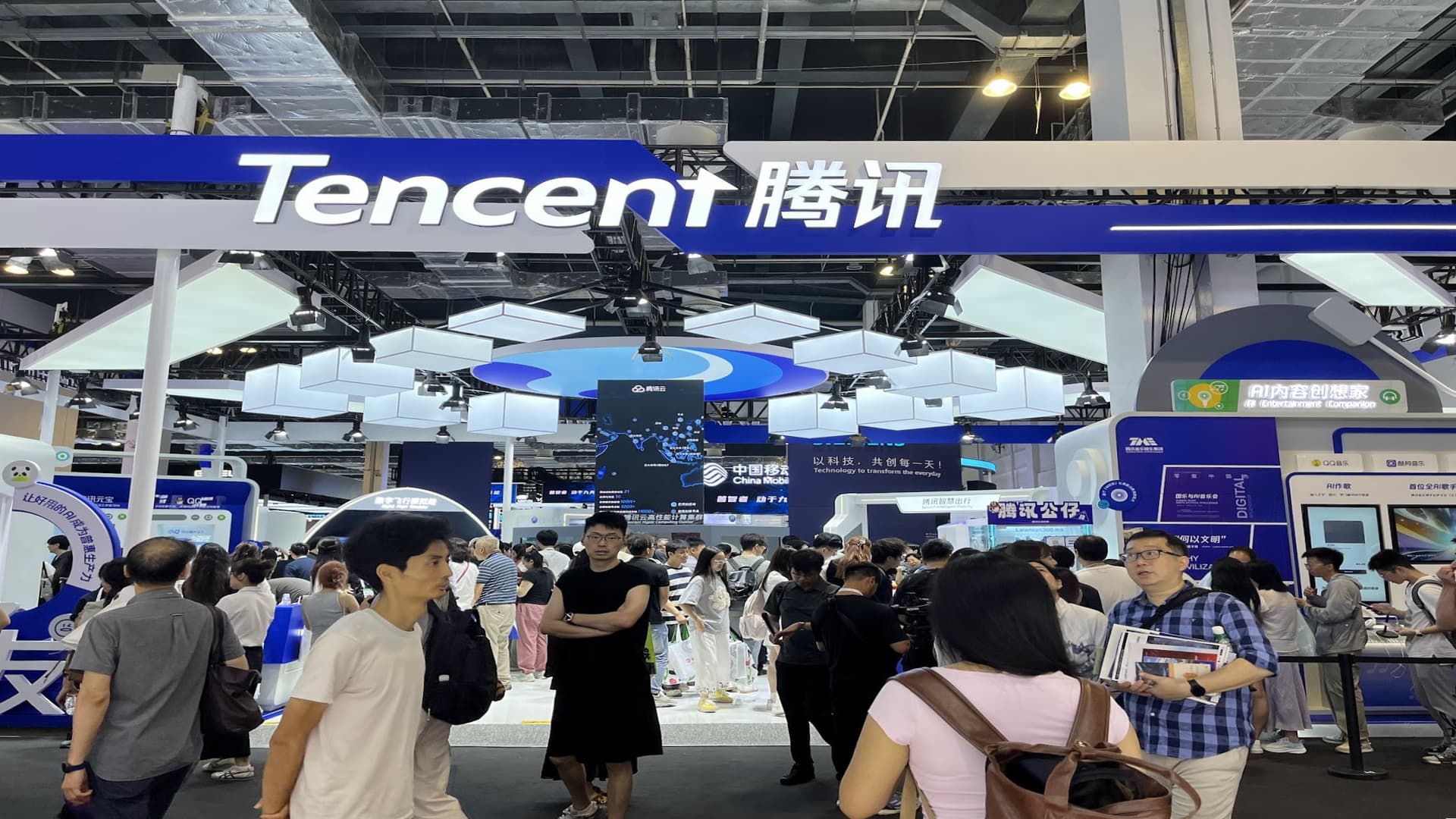Tencent shows off its various AI applications based on its Hunyuan model at the World AI Conference in Shanghai on July 26, 2025.
CNBC | Evelyn Cheng
This report is from this week’s edition of CNBC’s The China Connection newsletter, which brings you insights and analysis on what’s driving the world’s second-largest economy. Each week, we’ll explore the biggest business stories in China, give a lowdown on market moves and help you set up for the week ahead. Like what you see? You can subscribe here.
The big story
From startups to tech giants, Chinese companies are finding business demand for their artificial intelligence services, even as AI models elsewhere keep burning cash.
AI can now resolve more than 80% of online customer questions at Toyota’s joint venture with Chinese state-owned carmaker FAW, more than twice as many as it could address half a year ago, Wu Yongjian, vice president at Tencent Cloud, told me on Friday. Tencent provides some AI tools to the automakers.
And now it only takes around two weeks to get Tencent’s AI customer-service platform up and running, down from up to three months, Wu told me, as we sat inside the company’s shiny new office in an up-and-coming Shanghai waterfront district.
Over the weekend, Tencent announced an upgrade to its Hunyuan AI model alongside releases by other companies as the “World AI Conference” got underway in the city.
While not every company is seeing a similar demand for their products and services, the focus on business opportunities reflects a shift underway in China in capturing the AI opportunity. And that’s also reflected in job applications.
Zhou Yuxiang, CEO of Temasek-backed startup Black Lake Technologies, told me on Saturday that in the last few months he’s been getting resumes from AI model engineers who want to shift into developing AI for specific industry applications. “Before it was hard to get AI engineers,” he said in Mandarin, translated by CNBC.
Black Lake primarily sells AI tools to small factories in China to help them speed up production and better utilize capacity.
Many of the business owners are experiencing “FOMO” right now because they missed out on the direct-to-consumer e-commerce boom of the past few years, Zhou said, adding that the cost to use AI has also dropped significantly.
Z.ai, formerly Zhipu, on Monday became the latest Chinese startup to slash operating costs with an open-source AI model release. Its pricing undercut Alibaba-backed startup Moonshot’s Kimi K2 model released earlier this month, and DeepSeek’s R1 in January, which offered lower rates compared with what industry leader OpenAI was charging people to use ChatGPT.
Open source AI models can be used for free, and even altered and distributed, without special permission from the creator. Users who opt not to download the model can access them via the cloud and pay per use.
Quality data is the new gold
Many businesses are realizing they need to have better data in order to apply AI effectively. It’s a foundational layer that’s seeing huge demand, just like chips, even if monetization of the AI application takes time.
Chinese startup DeepExi, backed by venture capital firms Hillhouse and BAI, says its AI system combines business-specific data analysis with AI models to “deliver zero hallucination outputs.” That means the system does not make up results, as generative AI models are quite prone to do. CNBC was unable to independently verify the claim.
DeepExi lists clients such as Han’s Laser Technology and an unnamed public healthcare operator “that oversees 40 public hospitals and 100 clinics.”
The startup’s revenue surged by 88.3% to 242.9 million yuan last year, DeepExi said in an April filing with the Hong Kong Stock Exchange for a planned listing.
Data labeling, or annotating bits of information for better AI use, is also seeing surging demand.
Beijing-based Haitian Ruisheng last week estimated its revenue in the first half of 2025 grew by at least 61% from a year ago to 148.9 million yuan. Its revenue in 2024 was nearly 240 million yuan.
After excluding items, profit is expected to have more than doubled to between 4.5 million yuan and 4.9 million yuan in the first half of the year, according to the company’s filing with the Shanghai stock exchange.
Haitian Ruisheng counts ByteDance, Alibaba, Tencent, Baidu and several U.S. “Magnificent 7” companies such as Microsoft and Amazon as clients, Zhang Zhe, the company’s secretary to the board, said in Mandarin, translated by CNBC.
In China, the company sees the greatest monetization opportunities in education, healthcare and tourism, Zhang said, adding that there was also potential in smartphones and “embodied intelligence” — a category that includes robots.
Haitian Ruisheng combines automated data annotation with evaluation by human experts, Zhang said, adding that AI requires global cooperation and his company was eying overseas markets, with a subsidiary in Singapore.
Going global
Just days after the U.S. unveiled its AI action plan, the Shanghai-based “World AI Conference” opened Saturday with Chinese Premier Li Qiang announcing plans for a global AI cooperation organization. China called for supporting AI integration across industries, including manufacturing, healthcare, education and agriculture.
Tencent has already taken steps in that direction.
It has local partnership in Japan for a “virtual human service” that domestic businesses can purchase, Wu said. That’s a digital avatar of a human, often used for livestreaming and other digital content.
Other popular AI business lines in regions such as Southeast Asia include “know your customer” identification verification for finance, translation services as well as a platform for developers to develop AI agents, Wu said.
With these business projects — and broader state-backed ambitions — China has clearly gone beyond the labs in the global AI race.
Top TV picks on CNBC
Need to know
No U.S.-China trade truce extension yet. A possible extension of a tariff pause between Washington and Beijing will not be agreed to until President Donald Trump gives his nod, U.S. negotiators said Tuesday.
At least 30 people die in torrential rain. State media reported the deaths at the outskirts of Beijing after the capital city issued a red alert for heavy rain on Monday. President Xi Jinping called for more work on flood prevention and disaster relief in the broader northern region.
China ramps up support for births. The country on Monday announced the equivalent of about $500 a year per child under the age of three, following plans to roll out free preschool education.
In the markets
Mainland China and Hong Kong stocks were mixed Wednesday as U.S. trade talks with China hang in the balance.
Mainland China’s CSI 300 rose 0.51%, while Hong Kong’s Hang Seng Index — which includes major Chinese companies — was 0.45% lower as of 10:07 a.m. local time (10:07 p.m. ET on Tuesday).
The mainland benchmark has gained more than 5% so far this year, data from LSEG showed.

The performance of the Shanghai Composite over the past year.
Coming up
July 31: Politburo meeting expected
Official PMI for manufacturing, services
Nio to officially launch Onvo L90 electric car
Aug. 1 – 4: China Joy gaming conference in Shanghai
Aug. 1: S&P Global China General Manufacturing PMI
Aug. 5: S&P Global China General Services PMI








